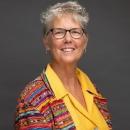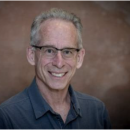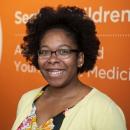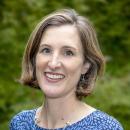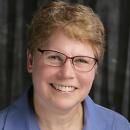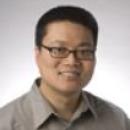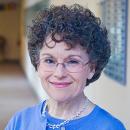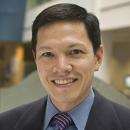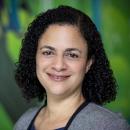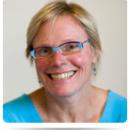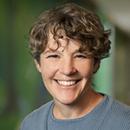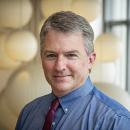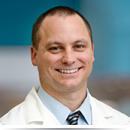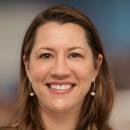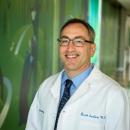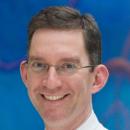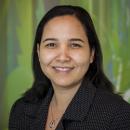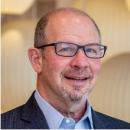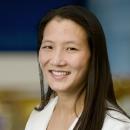- Erin Allen
Vice Chair, Administration and Finance
In my role within the UW Pediatrics executive leadership team, I focus on effective operations and financial sustainability of the academic department. My goal in serving as a coach is to support you to enhance and build on strengths, interest, passion; make meaningful connections that will serve you and your goals, and to encourage you to pursue that what gives you results, energy, and meaning. - Aarti Bhat
-
I look at coaching as an honest conversation with one's own self, mediated and facilitated by an 'external' coach. Nothing new is added to the mix besides objective exploration in a compassionate and judgment-free setting. As physicians, there are multiple dimensions of our identity, our responsibilities, our challenges and how we respond to them. Coaching allows us all time to slow down and self-reflect. Being able to share and learn in this space with a colleague would be a great way to partner in growth and service. - Douglas Diekema
Professor
Director of Education, Treuman Katz Center
Fellowship Director, Bioethics Fellowship Program
Chair, Institutional Review Board, Seattle Children's Research Institute
I am passionate about education and supporting colleagues and trainees to become the pediatrician and person that they aspire to be. Looking back on my 34-year career at Seattle Children’s I would have appreciated a coach to help me through the many struggles and challenges of an academic career. My goal as a coach is to support you in identifying your strengths, goals, and challenges so that you can better identify effective strategies to get from where you are now to where you hope to be in the future. - Yolanda N. Evans
-
One of the aspects of my current role as Division Head that brings me the most joy is supporting faculty and staff in their career development. This includes ensuring each faculty member can explore interests (new and established),is encouraged to address challenges, and supported in successes and opportunities for growth. The skills of coaching include asking open questions, understanding why concerns are important enough to matter, exploring ideas for navigating challenges. These aspects of my role and coaching will allow me to help others thrive. I am excited to serve as a resource to empower individuals to lean into strengths, decrease inequity and support faculty in career success. - Mollie G. Grow
Professor
Associate Program Director, UW Pediatrics Residency
One of my greatest joys is supporting people along the entire continuum of professional development in medicine. I am honored to help colleagues from pre-medical to faculty roles to discern their paths and connect with joy and meaning in their careers. I have learned so much from mentors and coaches in my own professional journey and loved learning with others in the Coaching for Leaders in Healthcare programs. Coaching is a special opportunity to engage in deeper conversations that facilitate connections with our own values and purpose. - Eileen Klein
Professor
Associate PEM Head for Faculty Affairs and Development
PECARN, STELAR node PI
The Coaching for Leaders Course gave me tools to enhance discussions I have with colleagues, mentees and others. I want to help those I meet with to clearly define their passions and goals thus helping to inform their career direction and life decisions. - Michael Leu
Professor
Program Director, University of Washington Clinical Informatics Fellowship
Pediatric Informatician
I’ve been at SCH since 2007, and through Clinical Effectiveness and informatics initiatives have worked closely with folks representing many different specialties. Having benefitted from coaching myself, my hope is to help individuals reflect and gain insights that will maximize their opportunities for success. I love helping people discover what they find to be the most important, helping them to take steps in that direction, through conversations in a supportive and safe environment. While my coaching practice is general, my academic interests include evidence-based medicine, clinical informatics, data-driven decision making, and graduate medical education. As I’ve chosen to mentor many individuals with their own unique goals over the years, I’ve helped many to navigate work-life balance and equity, diversity, and inclusion issues. - Tyler G. Ketterl
-
Tyler G. Ketterl, MD, MS is an attending physician at Seattle Children’s Hospital and Assistant Professor at the University of Washington School of Medicine. Dr. Ketterl is the Medical Director of the Adolescent and Young Adult Oncology Program. Dr. Ketterl holds triple board certifications in Internal Medicine, Pediatrics and Pediatric Hematology/Oncology. He completed his Internal Medicine and Pediatrics Residency at the University of Minnesota, Pediatric Hematology/Oncology fellowship at the University of Washington, and his Masters in Science in Epidemiology with a focus on clinical research methods at the University of Washington. - Susan Marshall
Professor
Attending Physician
Director, Medical Education, Seattle Children’s
I have immensely enjoyed and appreciated working with faculty, fellows, residents, and medical students as we navigate the professional and personal aspects of an academic career. As a pediatric pulmonologist, I have lived the challenges and demands of clinical work, scholarly pursuits and administrative responsibilities. I am also fully immersed in the world of medical education. Balancing work and home is a theme I know well (and aspire to!). I look forward to bringing coaching skills to enhance the personal and professional lives of my colleagues. - John McGuire
Division Head, Critical Care Medicine
Associate Professor
My experiences as a clinician, educational program director, clinical and basic science researcher, and Division Head provide me with perspectives on the challenges and experiences that faculty on all tracks, backgrounds, and career stages encounter in academic pediatrics. Formal coaching training has provided me with skills to support enable, and empower others to develop and refine their professional and personal goals, leadership, time management, and mentoring skills. - Esi Morgan*
Professor
Division Head of Rheumatology
* Note: Esi Morgan is not currently accepting coachees. - Ndidiamaka Musa
Professor
Director, Internal Coaching Program
I help practicing physicians get from where they are to where they want to be, by exploring their strength and values to become a better version of themselves and unlock their potential, through coaching. Ndidi is a physician who discovered the transformational change that coaching brings to high stress high stakes environment. She is a certified coach who has successfully coached physicians at various levels of their career, and will help you navigate challenges, and seize opportunity using an approach of active listening and inquiry that enables you to harness your inner and external resources to develop goals and plans to achieve results. I am a Professor of Pediatrics, a Fellow of the American College of Critical Care Medicine, and a board certified Pediatric Cardiac Intensivist with over 30 years of experience in academic medicine and leadership. I have mentored and advised faculty at various levels of their career and sat on multiple SOCs for fellows and junior faculty. At a national and international level, I have made significant contributions to the field of Pediatric Cardiac Critical Care and served on National and international organizational boards in various capacities. I am the Director of the UW Department of Pediatrics Internal Coaching Program and I'm working to establish a culture of coaching where everyone has access to this valuable resource of coaching to develop a successful academic career with clarity and purpose.
| - Cate Pihoker
Professor
Division Chief, Endocrinology
I am committed to helping the individual meet their potential in the manner that is most fulfilling and sustaining. I believe that coaching is a privilege, in which I build a trusting, collaborative relationship with my coachees. Through active listening and engagement, I strives to help coachees to recognize their inner strengths and values. A bit of a contemplative type myself, I encourages coachees in academic medicine to practice discernment—what are one’s priorities, personally and professionally at this point in their journey, and what brings the most joy. I have participated in coaching and leadership activities through Seattle Coach and through the Center for Courage and Renewal. I am a Professor of Pediatrics and Division Head for Pediatric Endocrinology. My entire career has been in academic medicine, as a clinician, clinical investigator and leader. In addition to coaching and mentoring, I work to integrate research equitably and consistently into clinical care. - Laura Richardson
-
Over the years, I have held many different roles in academic medicine including those of a researcher, clinician, teacher, fellowship director, and division chief. One of the most satisfying aspects of my work across all of these roles has been the opportunity to support the career development of others including fellows, early-career faculty, and mid-career faculty who are interested in pursuing career changes or leadership roles. I find that coaching provides an excellent platform for helping individuals to identify their own priorities and values, weigh opportunities, make the decisions that are most important to them, and develop strategies for addressing any challenges that arise. I am excited to be a part of this coaching program and to support faculty in developing fulfilling and successful careers. - Joan Roberts
-
I am excited to take a walk, slow down and get to hear your thoughts on career directions. I have worked in critical care here at Seattle Children’s since 1999, and hope to help others have insight into the phases of academic medicine. - Brian Saelens
Professor, Pediatrics and Psychiatry & Behavioral Sciences
Associate Division Head for Research at Center for Child Health, Behavior, and Development at Seattle Children's Research Institute
I have been on faculty at UW and Seattle Children’s since 2006. I have had the privilege to support, mentor, and collaborate with trainees and early career faculty particularly as they navigate establishing careers in pediatric health research. I continue to work on improving my coaching and mentoring - engaging in deep listening and partnering to identify strategies and actions that will help others achieve excellence and satisfaction in their work, family, and life goals. - Jack Salerno
Professor
Associate Division Chief, Cardiology
We are all aware of the steep learning curve when you're a new faculty member. But what happens when you accumulate knowledge and that learning curve begins to plateau? What are you going to do next? If you are interested in developing strategies to help you continue growing and improving, then coaching is for you! At one point in my career I plateaued and a coach helped me identify what was important to me. Although moving from the familiar/comfortable to the unfamiliar was stressful, in the end it was invigorating and the skills that he instilled in me helped me stay focused, engaged, and values-driven. I coached youth flag football and lacrosse for 6 years, and perhaps more importantly have done physician and leadership coaching for the past 8 years. I hope that we could partner to identify what matters to you, unlock your potential, and then hold you accountable to your new self! - Anne Slater
-
I have been on faculty at Seattle Children’s since 2009, and was recently promoted to clinical professor. In addition to my clinical work in the ED, I am also passionate about working with and supporting my colleagues. Too often, those of us in medicine find ourselves de-motivated and burned out--not having enough time, energy, or focus to create a fulfilling career. For me, coaching offered a unique opportunity to re-define what I considered to be success, and to utilize my values to cultivate the career I wanted. I’m excited to be among this group of coaches, and to offer others the same opportunity I had. My fellow physicians are amazing, and I want them to be able to unlock all of their potential to create a life they want. - David L. Suskind
Professor of Gastroenterology;
Director, Quality Improvement
As a child, my father told me that life is an adventure, a notion that has always resonated with me, especially during the difficult decisions we all face throughout our lives. As a coach, my goal is to help you navigate your own journey and guide you in charting your unique path through life's adventure. My journey has brought me a fulfilling career as a Professor of Pediatrics in the Division of Gastroenterology. Along this path, I've had the privilege of caring for my patients, leading national research on the impact of diet on inflammatory bowel disease, authoring multiple books and comic books, and establishing a nationally recognized center for inflammatory bowel disease at Seattle Children's. Most importantly, it has enabled me to truly enjoy life. - Jordan Symons
-
I’m Jordan; I’m one of the nephrologists here at Seattle Children’s. I’ve been at the hospital and in the Department for a while now, taking care of kids and families, working on dialysis and critical care nephrology topics, and doing some things in medical education. I am looking forward to meeting you and exploring ways to help you achieve your goals. Who do you want to be? Let’s take a journey together to find out.” - Amy Trowbridge*
Associate Professor
Education Director, Bioethics and Palliative Care Program
*Note: Amy Trowbridge is not currently accepting coachees - Rachel Umoren
Professor
Associate Division Head, Research
Medical Director, Inpatient Telehealth, Seattle Children’s Hospital
Adjunct Professor, Division of Healthcare Simulation Science & Department of Global Health
I am a compassionate and caring faculty member in Neonatology. Coaching provides me the opportunity to be of service and in support of others by listening with attention and providing thoughtful, probing questions. My goal is to support you in seeing what is important to you; leading to professional and personal decisions that support your goals and values. - Benjamin S. Wilfond
Professor
Adjunct Professor, UW Department of Bioethics and Humanities
My own journey in medicine and research involved embracing ambivalence and ambiguity as my career unfolded. I learned to balance deliberation and intuition as I made choices about career and life priorities and direction. As a coach, I aim to create a space to support faculty who consider questions such as “what do I want to do? why do I want to do it?”. Each of us must find our own tentative answer. My goal as a coach is to guide others find the right path for themselves. Each of our paths is unique and it is a privilege for me to support others navigating their journey. I have been at University of Washington since 2006, and was the division chief for Bioethics and Palliative Care and the director of the Treuman Katz Center till 2021. I currently focus on my research which aims to support families’ decisions about health care and clinical research. I have led a variety of federal and foundation funded research projects related to ethical issues in genetics, disabilities and clinical research. I also mentor early- and mid-career faculty to support the development of their research careers. - Delphine Yung
-
I am a newly promoted professor in pediatric cardiology and have spent almost 20 years as the director of the pulmonary hypertension program at Seattle Children’s Hospital. I enjoy taking care of really sick patients, working with my top-notch team, contributing to clinical research and interacting with colleagues at the hospital and at other academic centers. However, I was part-time for 14 years while raising 4 children, which slowed my career and led to malaise. Since returning to full-time, I completed a faculty “boot camp” program, which helped me learn a better way to achieve my professional goals, including time management, finding mentors and being intentional about my goals. It helped to increase my job satisfaction and to look for other areas that I find rewarding. Since then, I have become excited to help others who may be in a similar position to where I was. I hope the skills I am learning in the coaching program will help my colleagues reach their full potential and prevent burn-out in those most at risk, such as those who are historically under-represented and with a smaller support group.
|

